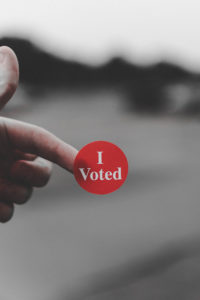Humanize the Vote
 Photo by Parker Johnson on Unsplash
Photo by Parker Johnson on Unsplash For the last twelve years, as the senior leader at the Washington Ethical Society, I have been a movement-bridger—often feeling like the most religious person in secular gatherings and the most secular person in religious gatherings. The Washington Ethical Society (WES) in Washington, DC, is part of the American Ethical Union, and through that connection is active with the American Humanist Association and the broader humanist movement. WES is also a member of the Unitarian Universalist Association, and the larger UU world. These connections, as well as my role as president of the Unitarian Universalist Humanist Association (UUHA), have allowed me to work with many amazing people working in the humanist world and in the UU world—but I’ve often wished they knew each other better.
My wish has been granted—and even better, it is emerging out of our shared work for justice in the world.
In the last few months the Unitarian Universalist Association (UUA) has rolled out UU the Vote, an outgrowth of their justice campaigns that focuses on bringing our “passion to the polls,” motivating voter turnout and voter engagement, and working against voter suppression. It’s an amazing campaign that promises to engage Unitarian Universalists across the country. Even during these strange virtual times, the campaign is responding with ways to reach out from your own home. (Read more at uuthevote.org.)
But, you may be asking yourself, is this just for Unitarian Universalists?
I wondered that too. Specifically, I wondered how the congregation I serve, which has Ethical Culture and humanism as core identities, might feel about being involved in a UU-branded campaign. Imagine my delight when I met with UU the Vote organizer B. Loewe and discovered that he had already been in discussion with Emily Newman—who works for the American Ethical Union and the American Humanist Association and also happens to be a member of the Washington Ethical Society—in thinking of ways to connect deeply and authentically with humanists across the United States. They adapted the #UUtheVote campaign to be #HumanizeTheVote. All the same resources and connections and ideas, with a humanist identity and connection.
My conversation with Loewe and with other folks at the UUA helped me to realize that #UUtheVote may be an internal ralling cry for Unitarians but ultimately the campaign is about relationships, not about branding—and all our relationships are about justice in the public sphere. Publicly, the UUA is using #VoteLove and #DefeatHate. The UUA is sharing their resources as broadly as they can, and they’re delighted to have communities make the work their own. We all know how delicate our democracy is and that we must take action together to protect it against growing narratives and policies of hate.
The UUA recommends ways that our local groups can take action and provides more great ideas with their comprehensive toolkit. They even made it easy to connect with other groups working on these actions so we can support and encourage each other.
So whether you are UU, humanist—or, like me, find yourself as a bridge-builder among worlds—I hope you will get connected with this campaign. Bring it to your local AHA chapter or affiliate, your local Ethical Society, your local UU congregation. Bring it everywhere you can, and bring our relationships and our work for justice with you.
Let’s #HumanizeTheVote!
